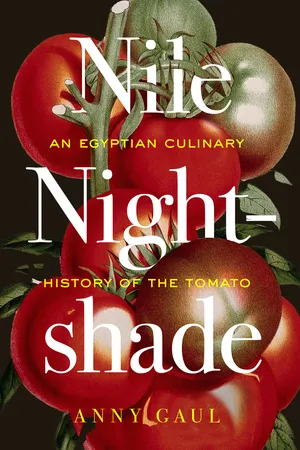
- English
- ePUB (mobile friendly)
- Available on iOS & Android
eBook - ePub
About this book
A cultural and culinary history of modern Egypt through the nation's beloved tomato.
By the end of the twentieth century, the tomato—indigenous to the Americas—had become Egypt's top horticultural crop and a staple of Egyptian cuisine. The tomato brought together domestic consumers, cookbook readers, and home cooks through a shared culinary culture that sometimes transcended differences of class, region, gender, and ethnicity—and sometimes reinforced them.
In Nile Nightshade, Anny Gaul shows how Egyptians' embrace of the tomato and the emergence of Egypt's modern national identity were both driven by the modernization of the country's food system. Drawing from cookbooks, archival materials, oral histories, and vernacular culture, Gaul follows this commonplace food into the realms of domestic policy and labor through the hands of Egypt's overwhelmingly female home cooks. As they wrote recipes and cooked meals, these women forged key aspects of public culture that defined how Egyptians recognized themselves and one another as Egyptian.
By the end of the twentieth century, the tomato—indigenous to the Americas—had become Egypt's top horticultural crop and a staple of Egyptian cuisine. The tomato brought together domestic consumers, cookbook readers, and home cooks through a shared culinary culture that sometimes transcended differences of class, region, gender, and ethnicity—and sometimes reinforced them.
In Nile Nightshade, Anny Gaul shows how Egyptians' embrace of the tomato and the emergence of Egypt's modern national identity were both driven by the modernization of the country's food system. Drawing from cookbooks, archival materials, oral histories, and vernacular culture, Gaul follows this commonplace food into the realms of domestic policy and labor through the hands of Egypt's overwhelmingly female home cooks. As they wrote recipes and cooked meals, these women forged key aspects of public culture that defined how Egyptians recognized themselves and one another as Egyptian.
Frequently asked questions
Yes, you can cancel anytime from the Subscription tab in your account settings on the Perlego website. Your subscription will stay active until the end of your current billing period. Learn how to cancel your subscription.
No, books cannot be downloaded as external files, such as PDFs, for use outside of Perlego. However, you can download books within the Perlego app for offline reading on mobile or tablet. Learn more here.
Perlego offers two plans: Essential and Complete
- Essential is ideal for learners and professionals who enjoy exploring a wide range of subjects. Access the Essential Library with 800,000+ trusted titles and best-sellers across business, personal growth, and the humanities. Includes unlimited reading time and Standard Read Aloud voice.
- Complete: Perfect for advanced learners and researchers needing full, unrestricted access. Unlock 1.4M+ books across hundreds of subjects, including academic and specialized titles. The Complete Plan also includes advanced features like Premium Read Aloud and Research Assistant.
We are an online textbook subscription service, where you can get access to an entire online library for less than the price of a single book per month. With over 1 million books across 1000+ topics, we’ve got you covered! Learn more here.
Look out for the read-aloud symbol on your next book to see if you can listen to it. The read-aloud tool reads text aloud for you, highlighting the text as it is being read. You can pause it, speed it up and slow it down. Learn more here.
Yes! You can use the Perlego app on both iOS or Android devices to read anytime, anywhere — even offline. Perfect for commutes or when you’re on the go.
Please note we cannot support devices running on iOS 13 and Android 7 or earlier. Learn more about using the app.
Please note we cannot support devices running on iOS 13 and Android 7 or earlier. Learn more about using the app.
Yes, you can access Nile Nightshade by Anny Gaul in PDF and/or ePUB format, as well as other popular books in History & Middle Eastern History. We have over one million books available in our catalogue for you to explore.
Information
Table of contents
- Series Page
- Title
- Copyright
- Subvention
- Dedication
- Contents
- List of Illustrations
- Acknowledgments
- A Note on Units of Measurement
- Chronology
- Introduction
- 1. Tomato Trajectories: From Mexico to Misr
- 2. How Do You Say “Tomato” in Egyptian?
- 3. Magnuna ya Oota: Tomato as Complaint
- 4. Defining Egyptian Taste: Tomatoes in Domestic Cookbooks
- 5. Creating Egyptian Flavor: Tomatoes in Home Kitchens
- 6. Red Stew, Green Stew: Cooking Okra in the Nile Valley
- Conclusion: How Tomatoes Became Egyptian
- Notes
- Bibliography
- Index